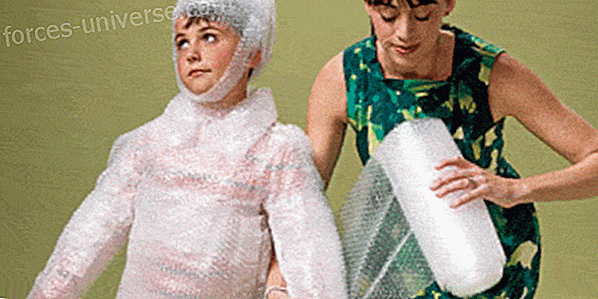 The characteristic that most emerges in a tyrant child is that he achieves what he desires through crying, tantrum, kicking, anger, irritability, closure, stubbornness.
The characteristic that most emerges in a tyrant child is that he achieves what he desires through crying, tantrum, kicking, anger, irritability, closure, stubbornness.
These children can destroy a place, harm other people, demonstrating their great frustration or anger at not getting the expected result.
They do not care what others want, but their own satisfaction. They want something now and they must get it, otherwise everyone will suffer the consequences.
Another feature is that they show total intolerance and frustration when someone marks a limit, even if they are not their parents . This happens because often, in the family context, they are not accustomed to receiving a clear “this is how far you can go ”. They feel they can do everything. They don't have the concept - because they haven't taught it - of respect, caring for the other, patience.
They manipulate the situations to their liking: "now I want, now I don't want"; "This yes or this no . " They make decisions that are too large for their young age and handle a difficult power to cope with.
That is why when they cannot manage to manipulate something, as usual, when they want another person or child to do what they want and do not achieve such a result, they cannot accept it, they throw themselves on the floor, they disrespect everything they want to intervene. They manifest a totally disproportionate conduct for what the situation warranted.
These children believe they can do what they want with the world and this is not real. The world will not allow them to do everything.
How do these behaviors originate?
It is important to clarify that a child is not born a tyrant, becomes a tyrant and this is something that is happening a lot today.
There is a current educational current that seeks to generate a flexible education. And he understands this flexibility as a "let be and do" education. Many parents from this vision fear being authoritarian, they let children make decisions from small to large. They don't know how to say "no"; they hesitate, they fear to block their abilities or their freedom. This also happens when you do not want to repeat the experience you had in childhood. " My parents have forbidden everything, I will never repeat something like that with my son." During the passage of time it has been seen parade different pedagogical currents that tried to offer guidelines regarding the education of the child: Total freedom, partial freedom, no type of freedom. However, we discover that there are no recipes, but that the point is to find the balance, without going to extremes, to find in each moment and situation the most appropriate response for the child we have at our side.
Other times there is no prior reflection, as I stated earlier. There are those fathers, mothers, teachers who do not know how to set limits. They do not possess the momentum, strength and internal decision to sustain a pattern. They are soft in character, undecided, insecure . They do not make aware of the importance that this can have in the education of the child, they do not work these aspects and they hurt the child for not offering an ingredient of absolute necessity for them: the limits.
In short, it has the root that it has, what happens is that these adults, from the first years of the child, continuously claud at their requests and whims.
They feel moved by the crying of the child, and because they do not want to harm their psyche, generate a blockage, or they cannot maintain any firmness, they feel unable to see the child "suffer", they access all their wishes.
It also happens that, to avoid conflict, the cries or crying of the child, at the first sign of discomfort, they change their mind and withdraw the limit.
Sometimes it also happens that between the father and the mother there are no agreements and they have important differences in the educational style. One agrees to everything he claims, and the other refuses to raise a capricious child because he sees the consequences it has. But after all, the child receives double speech and ends up deciding who is best for him.
This is not care or love, they are our own shortcomings disguised as it. We are analyzing - from our own fear, limitations or lack of information - what is best for the child and at the end of the road we generate more damage.
It is essential to reevaluate what concept of love and care we have. If love means total permissiveness to us.
What do these children need?
The child inside does not really feel powerful or safe; It is perceived alone, de-content, weak. His referents, parents or adults in charge, instead of giving him security, show him that they do not know what to do with him and how to master, guide or calm his greatest restlessness.
The child realizes that he can handle everyone to his liking, and this causes him such anguish, that he takes a tyrannical attitude, to show himself and be strong, before a totally insecure world.
What he most desires, deep down, is for the adult to take his place and place him in his own . He wants me to say “Enough. Rest well. You are safe by my side ”, and this is done through clear and defined limits, with love, security and confidence.
Children need guidelines, norms, habits, which does not mean that with them we cancel or control them, but quite the opposite. Thanks to this, we support his spirit so that, both in the first years and throughout his development process, they feel content, protected, loved and backed by safe adults. We do it so that this child is truly free.
Stay persistent in decisions. Do not break your decision as soon as the child insists in the ways that most tire and annoy him. Stand firm in the heart, not under threats. Know that you are giving love.
Breathe easy, you are not falling into authoritarianism. If you do not support your decision, do not mark a healthy authority, the child will not register any funds. You will have the sensation of falling into the void again and again, wishing someone would take it firmly and protect you. But the adult does not, because he believes that the child is flying freely.
Do not feel guilty about your role, but blessed by the opportunity to guide a being maturely. When you manage to lead it healthily it means that you have also grown, you have self-overcome and the relationship thanks to it has taken a leap.
Author: Nancy Erica Ortiz
This content is an excerpt from the 2nd. Stage of the Distance Course "Children of Today"
The Tyrant Child by Nancy Erica Ortiz






